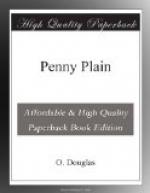“Poor Mother! You’ve been splendid!”
“If you aren’t happy, what does anything matter? I’m fair disheartened, I tell you. I believe you’re right. Money isn’t much of a blessing. I’ve never said it to you because you seemed so much a part of all the new life, with your accent and your manners and your little dogs, but over and over when people snubbed me, and I had to talk loud and brazen because I felt so ill at ease, I’ve thought of the old days when I helped your father in the shop. Those were my happiest days—before the money came. I had a girl to look after the house and you children, and I went between the house and the shop, and I never had a dull minute. Then we came into some money, and that helped your father to extend and extend. First we had a house in Murrayfield—and, my word, we thought we were fine. But I aimed at Drumsheugh Gardens, and we got there. Your father always gave in to me. Eh, he was a hearty man, your father. If it’s true what you say that none of you have charm, though I’m sure I don’t know what you mean by it, it’s my blame, for your father was popular with everyone. He used to laugh at me and my ambition, for, mind you, I was always ambitious, but his was kindly laughter. Often and often when I’ve been sitting all dressed up at some dinner-party, like to yawn my head off with the dull talk, I’ve thought of the happy days when I helped in the shop and did my own washing—eh, I little thought I would ever live in a house where we never even know when it’s washing day—and went to bed tired and happy, and fell asleep behind your father’s broad back....”
“Oh, Mother, don’t cry. It’s beastly of me to discourage you when you’ve been the best of mothers to me. I wish I had known my father better, and I do wish I could remember when we were all happy in the little house. You’ve never been so very happy in The Towers, have you, Mother?”
“No, but I wouldn’t leave it for the world. Your father was so proud of it. ‘It’s as like a hydro as a private house can be,’ he often said, in such a contented voice. He just liked to walk round and look at all the contrivances he had planned, all the hot-rails and things in the bathrooms and cloakrooms, and radiators in every room, and the wonderful pantries—’tippy,’ he called them. He couldn’t understand people making a fuss about old houses, and old furniture, grey walls half tumbling down and mouldy rooms. He liked the new look of The Towers, and he said to me, ’Mind, Aggie, I’m not going to let you grow any nonsense like ivy or creepers up this fine new house. They’re all very well for holding together tumbledown old places, but The Towers doesn’t need them. And I’m sure he would be pleased to-day if he saw it. The times people have advised me to grow ivy—even Lady Tweedie, the last time she came to tea—but I never would. It’s as new-looking as the day he left it.... You don’t want to leave The Towers, Muriel?”




